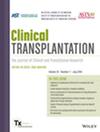Dietary restrictions for patients with end-stage kidney disease (ESKD) are burdensome. Kidney transplantation (KT) candidates who lack neighborhood resources and are burdened by dietary restrictions may have decreased access to KT.
In our two-center prospective cohort study (2014–2023), 2471 ESKD patients who were evaluated for KT (candidates) reported their perceived burden of dietary restrictions (not at all, somewhat/moderately, or extremely bothered). Neighborhood-level socioeconomic factors were derived from residential ZIP codes. We quantified the association of perceived burden of the dietary restrictions with a chance of listing using Cox models and risk of waitlist mortality using competing risks models. Then we tested whether these associations differed by neighborhood-level socioeconomic factors.
At evaluation, 18% of KT candidates felt extremely bothered by dietary restrictions. Those who felt extremely bothered were less likely to be listed for KT (adjusted hazard ratio [aHR] = 0.75, 95% confidence interval [CI]: 0.64–0.87); this association did not differ by neighborhood-level socioeconomic factors. Overall, the burden of dietary restrictions was not associated with waitlist mortality (p = 0.62). However, among candidates living in high food insecurity neighborhoods, those who felt extremely bothered had higher waitlist mortality (adjusted subhazard ratio [aSHR] = 2.07, 95% CI: 1.14–3.75, p[interaction] = 0.02). The association between dietary burden and waitlist mortality did not differ by neighborhood-level healthy food access.
The perceived burden of dietary restrictions is associated with a lower chance of listing for KT, and higher waitlist mortality only among candidates residing in neighborhoods with high food insecurity. Transplant centers should identify vulnerable patients and support them with nutrition education and access to food assistance programs.


